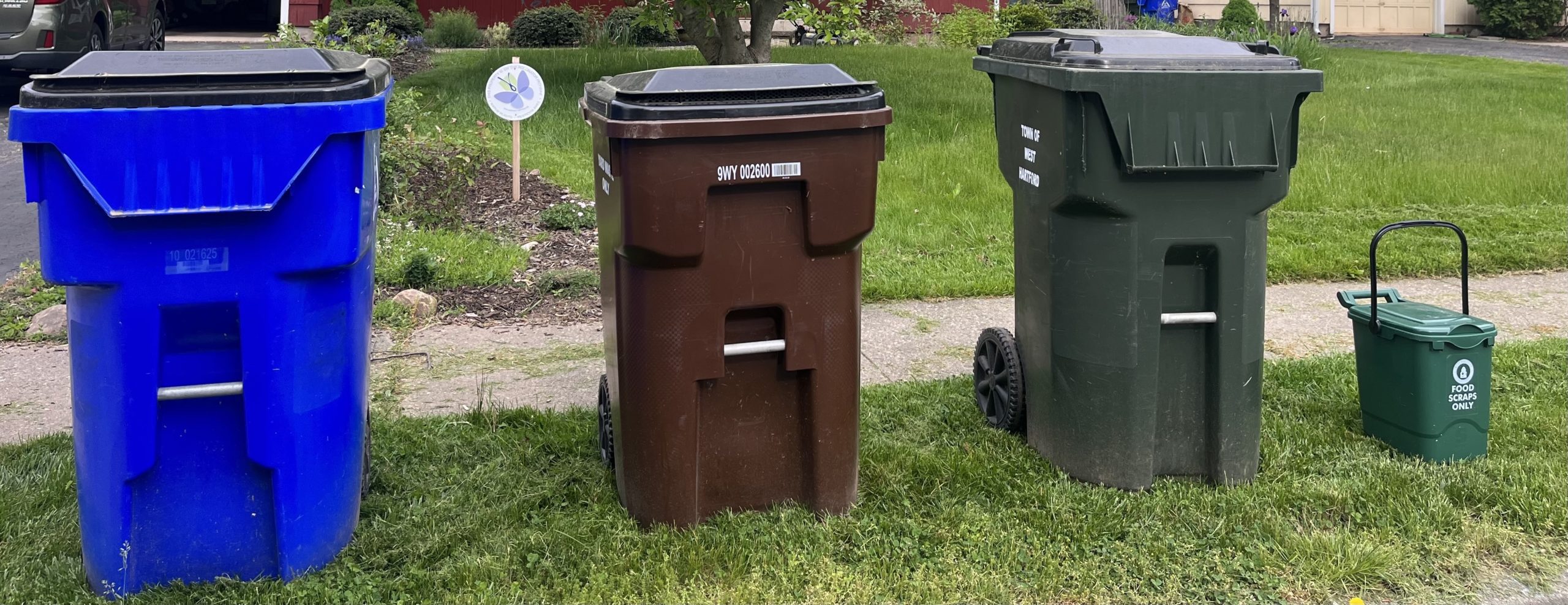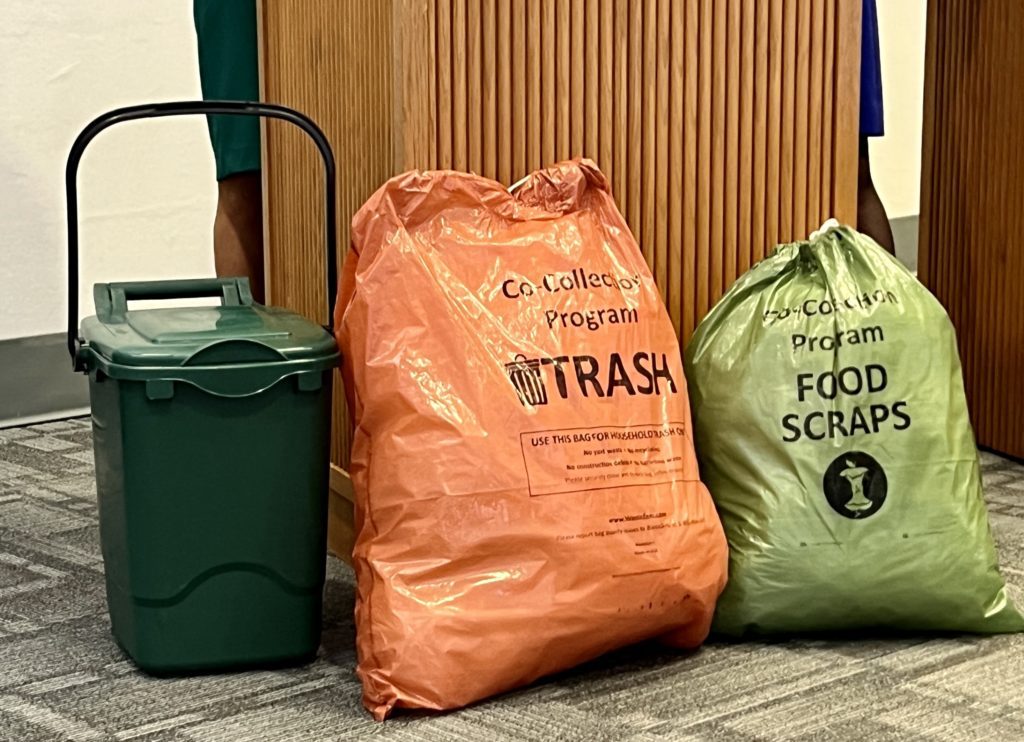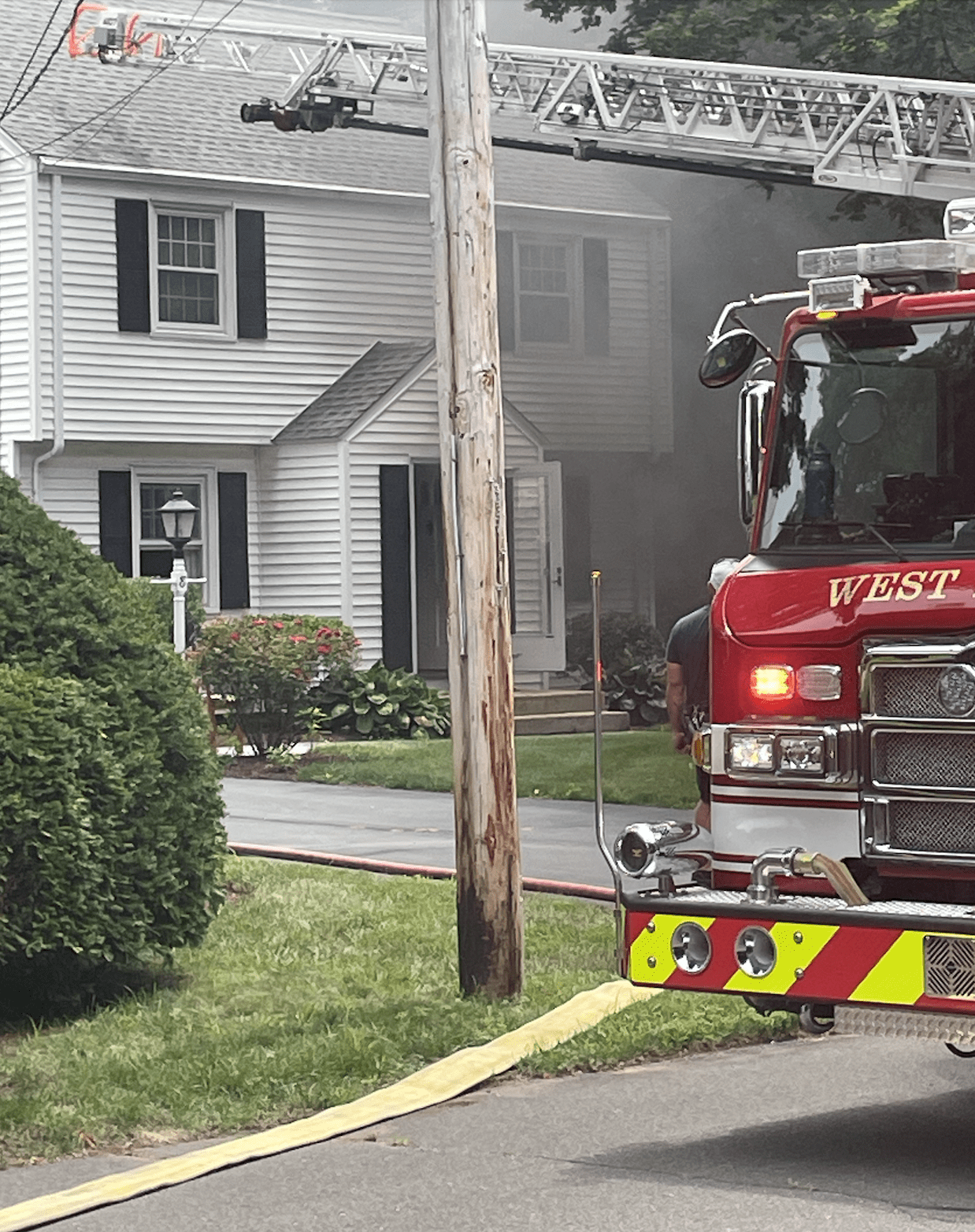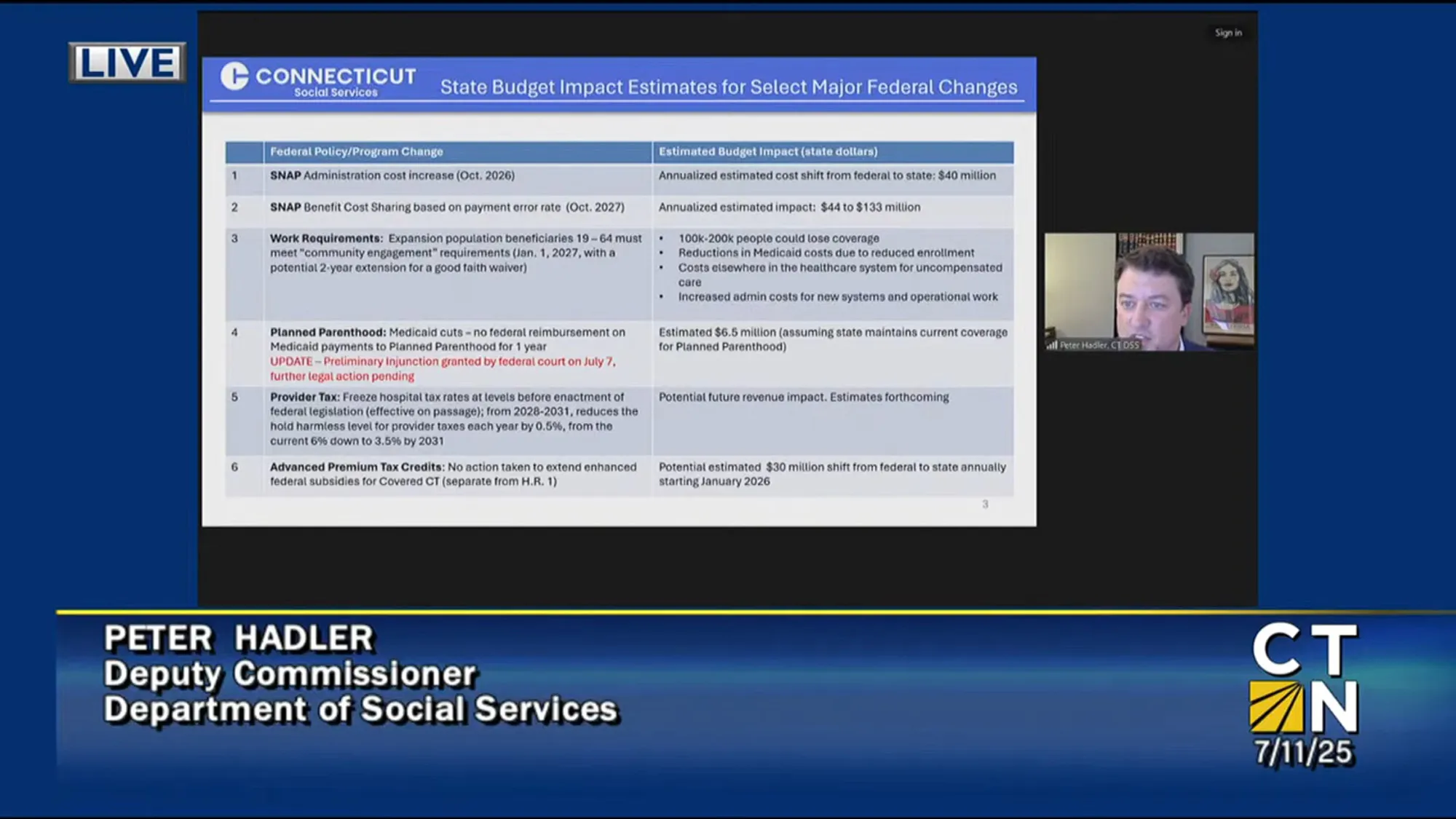West Hartford Hopes to Expand Food Scrap Recycling and Unit Based Pricing Pilot

Audio By Carbonatix

Participants in the food scrap recycling program have been given a small green bin to put at the curb on their trash pick-up days. Courtesy photo (we-ha.com file photo)
West Hartford Director of Public Works John Phillips and Town Manager Rick Ledwith said the curbside food scrap collection program has been successful and they are hoping that DEEP will provide a grant to both continue and expand the program.
By Ronni Newton
It’s no secret that Connecticut is facing a waste management crisis, and the Town of West Hartford, in looking to find solutions, has been piloting a food scrap recycling program along with a unit based pricing trial since the spring, with results indicating that a significant amount of material has been diverted from the waste stream.
The pilot program, funded by a grant from the state’s Department of Energy and Environmental Protection’s (DEEP) Sustainable Materials Management (SMS) program, has been operating since May 1 in a 685-home neighborhood in the Morley School area. Participation in the voluntary program has been close to 50%, and on average 1.37 tons of food waste has been removed from the waste stream each week, Director of Public Works John Phillips said in a report Thursday to the Town Council’s Public Works, Facilities and Sustainability Committee. On an annual basis, that would add up to 71 tons of food waste being diverted from just that neighborhood.
Under the terms of the current pilot program, the food scraps are being picked up weekly by Blue Earth Compost and brought to Quantum Biopower in Southington where they are converted to energy and compost.
In a letter dated Dec. 28, 2023 that Town Manager Rick Ledwith sent to DEEP, he stated that West Hartford would like to continue to pursue sustainable waste management practices, and would like to continue the pilot program – set to expire at the end of January – in the Morley neighborhood and expand a food scrap recycling and unit-based pricing (UBP) pilot to the remainder of the town.
In anticipation of receiving the SMS grant last year, the Town Council adopted a resolution committing to evaluate the pilot to determine future actions as a “foundation upon which the Town shall develop future priorities, legislation, policies, plans, budgets, and actions.”
“The town has a trash problem,” Phillips said in a phone interview, and the results of the pilot, combined with an anticipated significant increase in tipping fees when a new contract is in place for the upcoming fiscal year, indicates the need to “lean forward on unit-based pricing.”
The town’s current contract for waste management expires at the end of the current fiscal year and is out to bid now, and Phillips said while there is no concrete number yet there could be an increase of 15-20% in tip fees, which based on the 18,000 tons of waste that residents generate would be a huge budget increase.
“Our waste is still unmonitored and un-measured,” Phillips said. Whatever people throw out for the most part gets picked up, but the town needs to do its due diligence in exploring alternatives.
“It’s a utility cost. We have to pay whatever it is,” Phillips said of the current model. But if residents treated it as their own utility cost, the overall volume would likely decrease – especially when combined with food scrap recycling – and those who have less waste would not have to subsidize the trash generation of others.
“The Waste Working Group is working on this diligently,” Phillips said, referencing the group formed by the town’s new Sustainable West Hartford Commission that includes both commissioners and other town residents.
“From the moment the SWHC was formed it engaged on important projects facing the town and its residents,” said Bernie Pelletier, who chairs the Sustainable West Hartford Commission. “The waste crisis is the most immediate issue facing the commission. We’ve been really fortunate to have a dedicated citizens step in to examine options and find solutions. We are excited by the potential to radically reduce trash, increase food diversion, and increase recycling.” And separate from the efforts to expand the pilot, Pelletier noted that “Public Works is working on expanding Brixton Road’s capacities so that we can responsibly handle materials.”

A green food waste container has been distributed to all participants in the food scrap collection pilot, along with 15-gallon orange trash bags and 8-gallon green food scrap collection bags. Photo credit: Ronni Newton (we-ha.com file photo)
“The Waste Working Group within the Sustainable West Hartford Commission is excited to help our community embrace more responsible waste management,” said Rachael Virgin, who chairs the Waste Working Group. “While the waste crisis in our region can seem daunting, the enthusiasm and success in the DEEP pilot in the Morley neighborhood over the past year has given us valuable insight into how we might use Unit-Based Pricing and food scrap collection to achieve a better approach from an economic, environmental, and equity standpoint.”
Obtaining another grant from DEEP is critical to the efforts to not only continue the pilot program in the Morley neighborhood, but also to expand a pilot town-wide. Participation in the town-wide program would become mandatory, food scrap collection would be expanded to all homes, and the town would provide residents with “starter bags” for the UBP portion of the program and “need-based free bags for lower-income residents,” Ledwith said in his Dec. 28 letter.
The town is also looking into the possibility of a co-collection model – separate food and waste bags thrown into one container – but Phillips isn’t confident that any facilities locally that are equipped to accommodate what he said is a “value-engineered solution” that requires a site where co-collected material is first sorted, and would reduce municipal solid waste but less effectively and cleanly than the model of separate collections. It’s one of the options requested in the Request for Proposal (RFP) that Phillips has issued for waste management.
“We hope that DEEP will support our town’s commitment to this initiative, and we’re optimistic that we can give the entire community the chance to try this model in a town-wide pilot. Our WWG is committed to making this program acceptable to residents, and is rolling out a public education effort where we can share information and explore questions and concerns, and ways to support the unique needs of various groups. We feel that allowing residents to take personal responsibility for trash as a utility, just like water or electricity, is a critical shift for our town to make, and we’re excited to support our Public Works Department in that effort,” Virgin said.
Phillips said he is currently writing a business plan for the expansion of the pilot and a hopeful permanent solution. Ultimately the town will have to make a decision, he said, noting this is something he has been talking about for 10 years, and predicted would reach a crisis point by 2024 or 2025. While not directly impacting West Hartford, the closure of the Materials Innovation and Recycling Authority (MIRA) facility in Hartford last year brought the crisis to the forefront and the news, and more trash is now sent out of state, with transportation adding to the environmental impact.
The idea of implementing unit-based pricing in West Hartford was first floated in 2016, subsequently, but shelved due to significant resistance from the community. Now efforts are being backed by the state – which in 2023 funded pilot programs through a total of $5 million in grants – in an effort to show residents that this will work to reduce the amount of waste produced. West Hartford was one of 15 municipalities and three regional groups in Connecticut to receive a funding for the pilot announced in late 2022. The town was initially given $106,200, but another $7,800 was been added to the grant in order to cover the costs of enhanced reporting and the purchase of higher quality receptacles for the curbside food scrap collection.
Phillips said the last time there was this much focus on trash in West Hartford was in 1990, when the town’s sanitation department was eliminated and trash removal was outsourced.
In his letter to DEEP, Ledwith highlighted the alternatives that Public Works has been assessing in order to realize waste management objectives, as well as achieve and sustain a recycling/diversion rate of 60% as outlined in the state’s Solid Waste Management Plan. “From the perspective of our staff, it is our belief that unit-based pricing or Pay-As-You-Throw, coupled with food scrap diversion, holds the potential to be the most promising avenue for achieving waste management objectives,” Ledwith’s letter in part states.
At the Jan. 23 Town Council meeting, DEEP’s waste consultant, Waste Zero, plans to present what they state are the operational and fiscal benefits of UBP, food scrap collection, and other collection options. The town will look to make a decision by mid-May, according to Ledwith.
If the decision is ultimately made to move forward with town-wide food scrap collection and UBP, “this will be a generational change in how we manage waste,” Phillips said.
Ledwith shared his letter with the Town Council’s Public Works, Facilities and Sustainability Committee Thursday night. “Thank you to John [Phillips] for his leadership and tackling the waste crisis that we are facing as a state,” Ledwith said, noting that Phillips had the vision to start exploring this 10 years ago. “This memo to DEEP is a good start to a dialogue with them.”
Like what you see here? Click here to subscribe to We-Ha’s newsletter so you’ll always be in the know about what’s happening in West Hartford! Click the blue button below to become a supporter of We-Ha.com and our efforts to continue producing quality journalism.




My last trips to Ottawa, Montreal, and Portland OR all found small garbage cans vs. WH’s “personal dumpsters.”
Why not replace all the giant cans with smaller ones and have an annual fee for additional cans when households require them. The special bags are an expensive inconvenience that will prove more costly than the one time expense of can replacement.
Also, the root cause is not being addressed. The amount of packaging for retail goods and food is much more than necessary. I agree that landfills are a tight resource but the solution is not something towns can solve on their own. The state or higher should be assigning costs at the producer level and we will have less to throw away, even at current consumption levels.
[…] successful waste reduction pilot program has been underway in the Morley neighborhood, and 48% participation among the 685 households is the […]